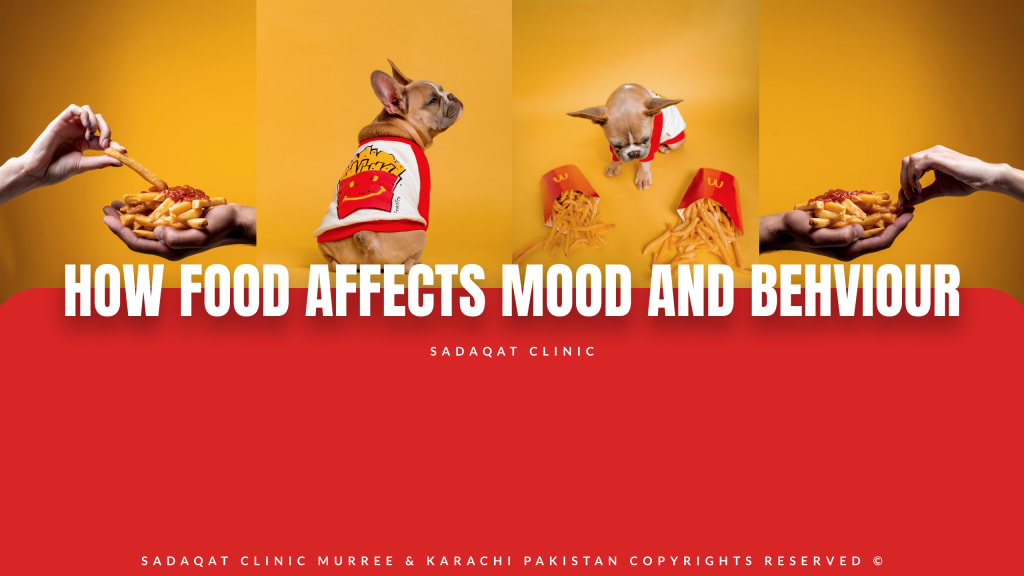Mood Is What The Food Is
The relationship between food and changes that happen in mood

The relationship between food and mood
It's long been known that the food we eat is directly linked to our overall physical health, but in recent years more research has been done on the mind-body connection, especially about nutrition. In an area of research known as "nutritional psychiatry," researchers are studying the relationship between food and mood, how what (and even when) we eat can directly impact our mental health and overall well-being. At the best addiction treatment centre in Karachi, we have observed that eating well keeps and a love for food keeps people away from drugs and alcohol.
For many people, healthy eating can seem challenging. Not only do we need to prioritize healthy eating habits that help the body function optimally, but we also need to realize the connection between physical and mental health. But with knowledge comes power, and in the case of personal health, intention.
How healthy eating affects the mind
According to Doctors, leaders in the emerging field of nutritional psychiatry, the American diet (traditionally high in saturated fat and high in nutrient-poor calories) is a major contributor to the rising incidence of depression. Paradoxically, for a country that has historically been concerned with nutrition and body health, many Americans don't even know that what we eat can affect the way we feel. Healthy eating is researched at the best addiction treatment centre in Karachi that helps the body fight back anxiety and depression.
While the brain is home and controls mental health and overall functioning, there is also a direct connection between the gut and the mind through the vague nerve. The gastrointestinal tract is referred to as the "other brain" as it is believed to produce 90-95% of serotonin, a chemical that helps regulate mood and is thought to have a direct connection with anxiety and depression disorders. The foods we stuff ourselves with matter a lot. The human brain needs a variety of nutrients, such as fatty acids and various vitamins, to function optimally, and many of these are found in various foods of plant origin. However, very few people consume sufficient amounts of these or none at all. According to a study published by the Government Departments working on disease control only 10% or 1 in 10 adults consume the recommended 1.5-2 cups of fruits and 2-3 cups of vegetables daily.
What to eat?
In general, experts advise people to minimize meat and dairy consumption and emphasize nutritious foods, such as those containing healthy fats, whole grains, legumes, and other vegetables. A focus on colour and a variety of natural, nutrient-dense foods also provide us with an array of healthy raw foods that help us function and perform at our best. One of the biggest problems in today's society is the dependence on highly processed (but easily/quickly available) foods. Many ready-made snacks and meals are high in sugar, and although sugar can cause a temporary increase in various "good" chemicals like dopamine, it causes inflammation in the gut that feeds bad bacteria and leads to mood and energy swings. At the best addiction treatment centre in Karachi, we recommend eating veggies, meat, grains and dairy products in optimum amounts would be healthier than fast food.
As the brain and nervous system rely on food to build new products such as cells and tissues, it is important to provide the body with the carbohydrates, proteins, and minerals it needs. For optimal physical and brain health, experts recommend including (and prioritizing) these food groups in your daily diet:
Complex carbohydrates: these are foods made up of sugar molecules that the body converts into glucose, a compound the body uses for energy. Foods such as pulses, beans, whole grains, and various starchy vegetables have a high nutritional value and help keep you full.
Lean proteins: proteins work hard to build muscle mass and perform important functions; lean proteins contain less saturated fat without compromising nutrients and provide sustained energy. Most poultry and fish are lean, but there are also plant-based foods like soy (in all forms), various nuts, and seeds.
Fatty acids: healthy acids and oils help lower cholesterol and support the body's systems; they are found in a variety of fish and meat products as well as eggs, flaxseeds, and nuts.
There are countless diets and paradigms for the ultimate maintenance of good health, but the consensus is a combination of more fruit and vegetables (high in fibre and antioxidants), equal amounts of protein and whole grains, and small amounts of natural fats.
Diet matters too
Our culture is increasingly based on "touch and go", rushing and strategically planning tasks and playtime in our busy lives. Often, we don't have time to enjoy the food we eat; we watch TV while we eat dinner and we rarely have a purposeful focus on eating. What was once necessary, life-giving nourishment is now (for many) just an annoying stop we have to make to avoid giving up everything else we want to do.
Conscious mindfulness (in all areas of life, but especially when eating) can be a great way to get in touch with our bodies and the present moment we are living in. Much of health and well-being depends on mindfulness. Once we are aware of it, it becomes a little easier to make healthy, wise, and right choices for our mind and body.






Comments
There are no comments for this story
Be the first to respond and start the conversation.